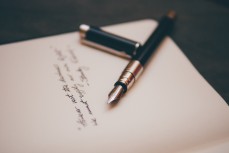Research all NYC schools
Research Now
Study Tips To Conquer Tests

Have you ever studied really hard for a quiz or a test, but drew a blank when you sat down to take it? I am sure this has happened to almost everyone at some point, and it can be very frustrating and discouraging. It can be easy to blame failing a test on not studying for it, however, it can be hard to diagnose why one may be struggling if they are working hard. If you frequently face this problem, please understand that you’re not alone and that there are many strategies you can input into your study time that will allow you to achieve greater success.
The first study tip I have is best implemented with quizzes or tests that are based around memorization. This could be memorizing vocabulary words for an English or foreign language assessment, or trying to remember key dates or events for a history class. Always use flashcards to remember these terms. Actual flashcards are useful for several reasons. First of all, the act of writing down what you need to remember greatly increases the likelihood that you will remember it. Studies have proven that one is far more likely to remember what they write over what they type. Flashcards also allow you to easily test yourself on what you are remembering which will improve your retention of the words. Testing yourself on what you remember can make a massive difference between passing and failing a test.
I also highly recommend removing any major distractions from your work area such as your phone. You are sitting in your work area to study, not waste time and distract yourself. If you use your phone while studying you will be distracted which will waste time and cause you not to remember as much. Schedule 25-30 minute study blocks and then take short five to ten minute breaks in between to check your phone and recharge your brain. You don’t want to distract or exhaust your brain when studying.
The idea of exhausting your brain flows perfectly into my final and perhaps most important tip: try to get enough sleep. If your brain is tired, it won’t be able to function properly when you take your actual assessment the next day. Obviously, we all need to stay up late studying sometimes, but we all should keep late nights to a minimum. Studying really late can actually have adverse effects on your overall test performance. If it's getting really late and it’s clear that you are struggling to absorb the information you are studying, get some rest, and try and see if you have time the next day to review your notes before your assessment. Studying that late at night won’t be beneficial for you anyways.
In essence, the key essential tips to take away from this article are to use flashcards to actively test yourself while studying, remove distractions from your work area, and get enough sleep! If you follow all of these strategies, I believe that you will find greater success in the future. I hope these tips were helpful, and that you will improve your quiz and test grades after implementing them!
Paris William Polatidis is a Junior at Xavier High School in NYC. He enjoys playing tennis, writing for the Xavier Review, and helping others out when they need support.

Join to NYCMentors.org
Join today and have a high school mentor guide your child through their middle school years
Join NowOther articles
-

How Volunteering and Extracurriculars Can Affect Applications and Where to Go?
- April 11, 2023
- Dean Domingo
Volunteering and extracurriculars are activities that can benefit both the community and yourself. For middle school students, volunteering and doing extracurriculars provide opportunities to develop new skills and interests and demonstrate to high schools that you are well-rounded and hardworking. High Schools are always looking for capable students willing to do more than what is required. So if you’re not doing extracurriculars and/or volunteering, getting the headstart and being a part of a club or helping out your community is the best way to demonstrate to schools that you are a hardworking and all-around person.
-

Tips for Attending High School Information Sessions
- March 28, 2023
- Sereia Sarumida
Public high school admissions decisions came out on March 9th, and families have until April 5th to accept an offer. Many high schools are now offering information sessions, open houses, and virtual events for accepted students. These events are the perfect opportunity to ask students and teachers detailed questions about the schools, so you can decide which one is the best fit for you. If you have trouble getting started thinking of questions to ask, asking these sample questions (divided by topic) can help you to consider a broad range of factors to decide on a school to attend!
-

How to Write an Outstanding Essay for your High School admission process
- February 21, 2023
- David Romero
The highschool admission process is very stressful. With all of its different required parts, the essay section of the application can be really overlooked. The essays are a chance for the admission officer’s to get an insight into who the applicant really is. Numerous people can have very similar transcripts, but a creative and charismatic essay will make an application stand out.
-

How to Ask for a Recommendation Letter and How to Pick the Right Candidate for the Job
- February 12, 2023
- Dean Domingo
Recommendation letters are a key aspect of high school applications and are a great way to demonstrate your character and abilities from another perspective. While not mandatory in some schools, it’s highly encouraged and should be seen as a requirement. But, who do you ask for a recommendation letter? Choosing who to ask is very important and should be someone that has seen your growth as a student. Most schools usually require at least one recommendation letter from a core teacher (Math, Science, Social Studies, etc) and one letter from either another teacher, mentor, coach, or counselor. So after making a list of potential candidates take some time to consider a very important question. “Who knows you the most?”. If you choose a candidate that barely knows you, their letter may sound disingenuous and phony. So when selecting a recommender, you should consider someone who has had a significant impact on your life and should be someone who knows you both academically and personally and can attest to your abilities, interests, achievements, and growth.
